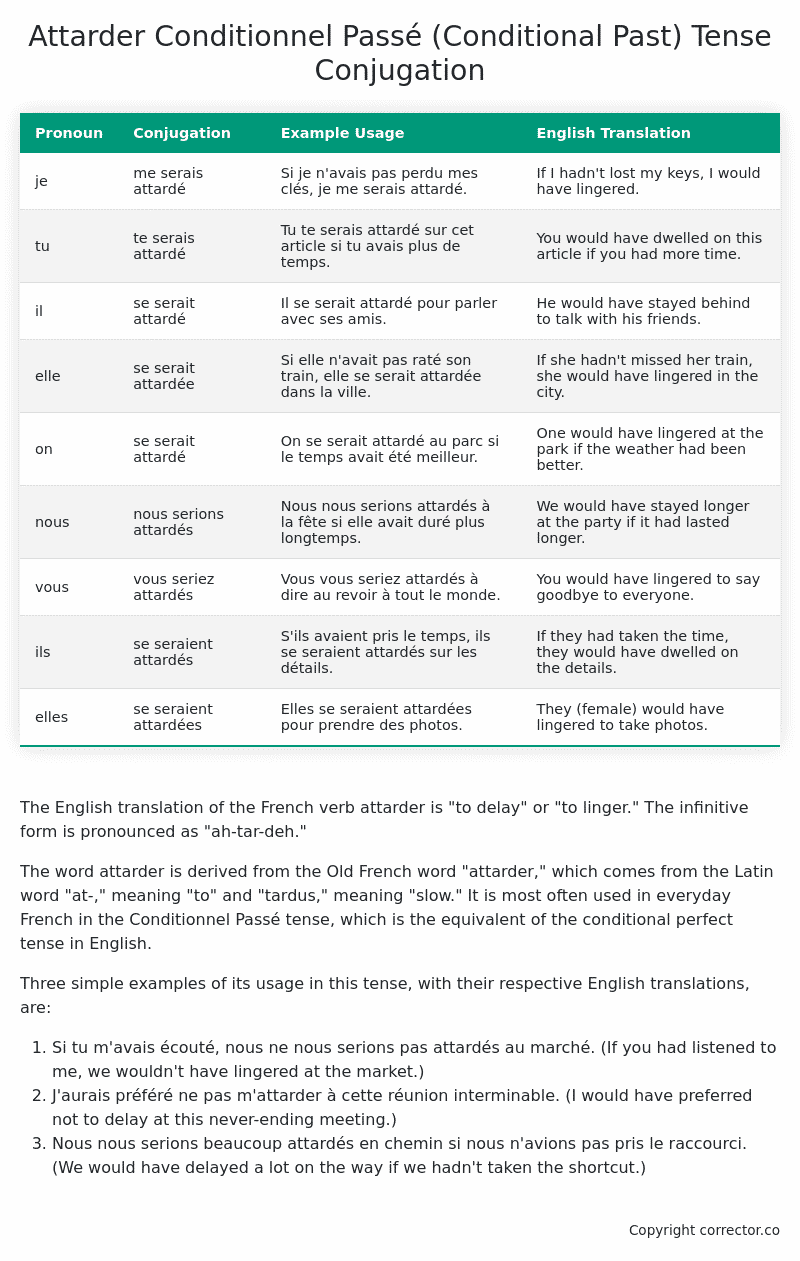Conditionnel Passé (Conditional Past) Tense Conjugation of the French Verb attarder
Introduction to the verb attarder
The English translation of the French verb attarder is “to delay” or “to linger.” The infinitive form is pronounced as “ah-tar-deh.”
The word attarder is derived from the Old French word “attarder,” which comes from the Latin word “at-,” meaning “to” and “tardus,” meaning “slow.” It is most often used in everyday French in the Conditionnel Passé tense, which is the equivalent of the conditional perfect tense in English.
Three simple examples of its usage in this tense, with their respective English translations, are:
- Si tu m’avais écouté, nous ne nous serions pas attardés au marché. (If you had listened to me, we wouldn’t have lingered at the market.)
- J’aurais préféré ne pas m’attarder à cette réunion interminable. (I would have preferred not to delay at this never-ending meeting.)
- Nous nous serions beaucoup attardés en chemin si nous n’avions pas pris le raccourci. (We would have delayed a lot on the way if we hadn’t taken the shortcut.)
Table of the Conditionnel Passé (Conditional Past) Tense Conjugation of attarder
| Pronoun | Conjugation | Example Usage | English Translation |
|---|---|---|---|
| je | me serais attardé | Si je n’avais pas perdu mes clés, je me serais attardé. | If I hadn’t lost my keys, I would have lingered. |
| tu | te serais attardé | Tu te serais attardé sur cet article si tu avais plus de temps. | You would have dwelled on this article if you had more time. |
| il | se serait attardé | Il se serait attardé pour parler avec ses amis. | He would have stayed behind to talk with his friends. |
| elle | se serait attardée | Si elle n’avait pas raté son train, elle se serait attardée dans la ville. | If she hadn’t missed her train, she would have lingered in the city. |
| on | se serait attardé | On se serait attardé au parc si le temps avait été meilleur. | One would have lingered at the park if the weather had been better. |
| nous | nous serions attardés | Nous nous serions attardés à la fête si elle avait duré plus longtemps. | We would have stayed longer at the party if it had lasted longer. |
| vous | vous seriez attardés | Vous vous seriez attardés à dire au revoir à tout le monde. | You would have lingered to say goodbye to everyone. |
| ils | se seraient attardés | S’ils avaient pris le temps, ils se seraient attardés sur les détails. | If they had taken the time, they would have dwelled on the details. |
| elles | se seraient attardées | Elles se seraient attardées pour prendre des photos. | They (female) would have lingered to take photos. |
Other Conjugations for Attarder.
Le Present (Present Tense) Conjugation of the French Verb attarder
Imparfait (Imperfect) Tense Conjugation of the French Verb attarder
Passé Simple (Simple Past) Tense Conjugation of the French Verb attarder
Passé Composé (Present Perfect) Tense Conjugation of the French Verb attarder
Futur Simple (Simple Future) Tense Conjugation of the French Verb attarder
Futur Proche (Near Future) Tense Conjugation of the French Verb attarder
Plus-que-parfait (Pluperfect) Tense Conjugation of the French Verb attarder
Passé Antérieur (Past Anterior) Tense Conjugation of the French Verb attarder
Futur Antérieur (Future Anterior) Tense Conjugation of the French Verb attarder
Subjonctif Présent (Subjunctive Present) Tense Conjugation of the French Verb attarder
Subjonctif Passé (Subjunctive Past) Tense Conjugation of the French Verb attarder
Subjonctif Imparfait (Subjunctive Imperfect) Tense Conjugation of the French Verb attarder
Subjonctif Plus-que-parfait (Subjunctive Pluperfect) Tense Conjugation of the French Verb attarder
Conditionnel Présent (Conditional Present) Tense Conjugation of the French Verb attarder
Conditionnel Passé (Conditional Past) Tense Conjugation of the French Verb attarder (this article)
L’impératif Présent (Imperative Present) Tense Conjugation of the French Verb attarder
L’infinitif Présent (Infinitive Present) Tense Conjugation of the French Verb attarder
Struggling with French verbs or the language in general? Why not use our free French Grammar Checker – no registration required!
Get a FREE Download Study Sheet of this Conjugation 🔥
Simply right click the image below, click “save image” and get your free reference for the attarder Conditionnel Passé tense conjugation!

Attarder – About the French Conditionnel Passé (Conditional Past) Tense
Formation
Common Everyday Usage Patterns
Expressing Unreal Past Scenarios
Polite Requests or Suggestions
Expressing Doubt or Uncertainty
Interactions with Other Tenses
Conditional Present
Indicative Past Tenses
Conditional Future
Summary
Want More?
I hope you enjoyed this article on the verb attarder. Still in a learning mood? Check out another TOTALLY random French verb conjugation!


